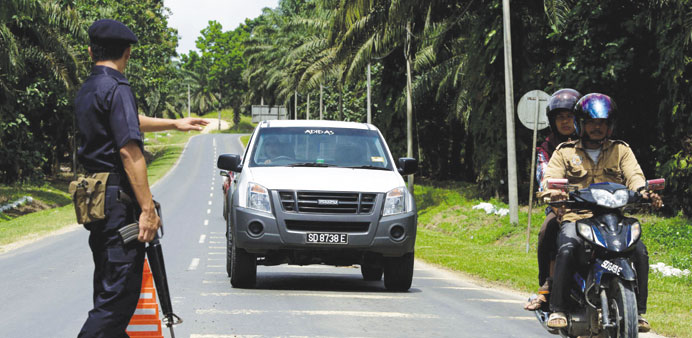A Malaysian armed policeman (left) mans a security check in Sahabat 7 on the road leading to Tanjung Tanduo, in the areas where suspected Philippine militants are holding off, on the island of Borneo yesterday.
Reuters/Lahad Datu, Malaysia
A peace deal between the Philippines and rebels has alienated traditional rulers and their followers about 100 of whom have occupied a village in nearby Malaysia, a member of the old ruling family said yesterday.
The stand-off with police in Malaysia’s eastern state of Sabah has threatened to spark tension between the Philippines and Malaysia, whose ties have been periodically frayed by security and migration problems along their sea border.
Security analysts had warned that the historic peace deal signed by the Philippine government and rebels last October to end 40 years of conflict in the Philippine south risked stirring instability by alienating powerful clan leaders. Jamalul Kiram III, 74, a former Sultan of the Sulu region of the southern Philippines and brother of the man Philippine provincial authorities regard as sultan, said the peace deal had handed control of much of Sulu to Moro Islamic Liberation Front (MILF) rebels, ignoring the sultanate.
He said the group of sultan loyalists had gone to Malaysia as a protest action in response to what they saw as the unfair peace deal, and they would not back down.
“Those people are willing to die for our cause,” Jamalul said in the Philippines.
The group of 100 armed men has refused to move from the village they have occupied for nearly a week, despite pleas from both the Malaysian and Philippine governments to return to the Sulu archipelago on the Philippine side of the sea border.
Malaysian police armed with machine guns have surrounded the village in a palm-oil plantation area. Malaysian officials said over the weekend that the group’s demands would not be met and that the men would be deported soon, without specifying how.
Jamalul said the Sulu royal family had asked to take part in the peace negotiations because the old sultanate’s territories would be part of a new autonomous Muslim area, but they were rebuffed by the Philippine government. Jamalul complained that he was never “acknowledged” when Philippine President Benigno Aquino witnessed the signing of the deal in Manila last October. “We were not consulted. When we learned that the government and the MILF will sign an agreement, we met on October 11 and decided to take action to reclaim our lands,” he said.
Those lands to be claimed, include Sabah, he said.
In an arrangement that stretches back to British colonial times, Malaysia pays a token amount to the Sulu sultanate each year for the “rental” of Sabah.
Jamalul said his followers were demanding recognition from Malaysia as the rightful owners of Sabah and renegotiation of the original terms of the lease with a British trading company.
A letter will be sent to the Malaysian government today to start negotiations to end the stand-off, he said.

